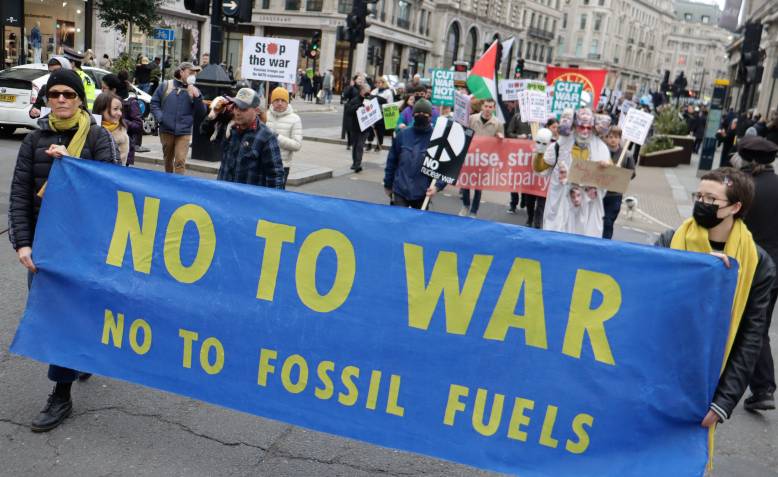 Stop the War in Ukraine protest, London, 6 March. Photo: Steve Eason / Flickr / CC BY-NC 2.0, license linked below article
Stop the War in Ukraine protest, London, 6 March. Photo: Steve Eason / Flickr / CC BY-NC 2.0, license linked below article
The latest IPCC report points to the structural change needed to avert disaster. Our leaders driving war at this time is further proof that they don’t have the solutions, writes Feyzi Ismail
The second instalment of the IPCC report came out this week and makes for sober reading. It is as bleak as ever, with some scientists calling it the bleakest warning yet. It forecasts hunger on a scale never seen, mass extinctions and irreversible devastation. This is a certain future, the report suggests, unless we make ‘fundamental changes to how society functions’.
The landmark IPCC report compiles tens of thousands of scientific papers and was first published last August. While the first report was unequivocal about the causes of the crisis – that human action (and inaction) is responsible – the new report focuses on irreversible impacts and the links between climate change and biodiversity loss. No country or region is spared, but about half the world’s population is highly vulnerable to the worst effects. It describes the consequences in terms of food and water shortages, with estimates that 183 million more people could go hungry by 2050.
Like the last report, the latest IPCC assessment underlines the notion of a rapidly closing window to secure the future of civilisation and that we are reaching the limits of our ability to adapt as heating increases. This is because feedback loops are reinforcing some of the changes, making them irreversible. Keeping within the target of 1.5C is unlikely, even with massive cuts to greenhouse gas emissions, but catastrophe can be avoided.
What is striking in the new report is the much sharper acknowledgement that changes need to be made to ‘underlying values, worldviews, ideologies, social structures, political and economic systems, and power relationships’, which effectively means changing social relations.
Based on the latest science, it suggests that system change is unavoidable if humanity is to have a future. This is as much to do with how we change society as it is to do with the science, and politics is central to changing society. Inequalities of ‘gender, ethnicity, disability, age, location and income’ need addressing as we cut emissions. Processes of adaptation and mitigation can point to more fundamental changes that are necessary. Mobilising public opinion, making demands, engaging in collective action – these are the building blocks towards forcing governments and corporations at national and global levels to act.
The report comes out the same week that Russia launched its offensive against Ukraine, and as Nato and Western allies step up counterattacks, starting with economic sanctions against Russia, and arms and financial aid to Ukraine. Russia has responded by putting its nuclear weapons systems on high alert.
The Russian invasion is a disaster for the people of Ukraine and could have much wider impact. If offensive and counteroffensive continue, escalation could easily spiral out of control on a global scale. Yet war is a major, largely unacknowledged driver of climate change. Not only could money for war be spent on welfare – it’s estimated that the war in Ukraine could cost the global economy some $400 billion this year – but war itself is destroying the planet. The use of bombs, toxic chemicals, landmines and so on have lasting effects.
Estimates are that 20% of global environmental degradation is due to military activities. The fact that imperial rivalries have led the world into another major conflict at a time of existential threat to the planet is further proof that our leaders and the system they defend is simply incapable of addressing the basic issues facing humanity, of taking society forward. Many of the imperialist wars are also wars for oil and gas.
This is before we speak of the cataclysmic dangers of nuclear powers going to war. On Friday, Ukraine’s nuclear power plant at Zaporizhzhia was attacked and taken over by Russia, and could have led to an accident, given that a fire broke out near the facility after being shelled. Zaporizhzhia is Europe’s largest nuclear power plant, and Ukraine is home to Chernobyl, the site of the world’s worst nuclear accident in 1986.
We need to be doing everything we can in the days, weeks and months ahead to bring an end to this horrific war. Cutting war would be a massive start to cutting emissions and must be part of the project of mitigation. But we must also understand, as even the mainstream IPCC is now suggesting, that the whole social structure needs to be overturned.
Join Revolution! May Day weekender in London
The world is changing fast. From tariffs and trade wars to the continuing genocide in Gaza to Starmer’s austerity 2.0.
Revolution! on Saturday 3 – Sunday 4 May brings together leading activists and authors to discuss the key questions of the moment and chart a strategy for the left.

